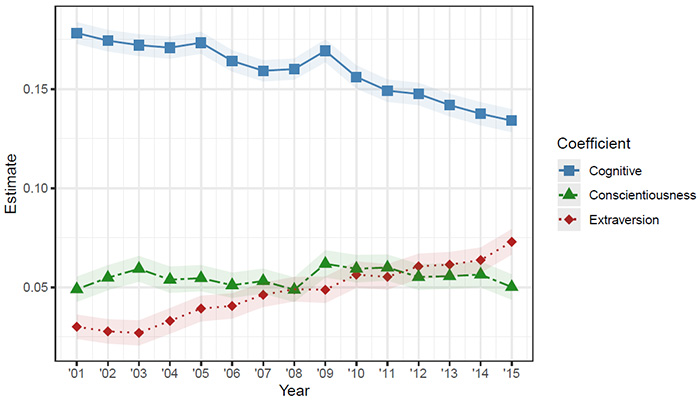A study: Extroversion has become more valued in the labour market – success can be achieved with more than just intelligence

Since the early 2000s, the value of being extrovert has increased in the labour market. "Conscientiousness and education are still valued, but there is also new emphasis being placed on extroversion including sociability, activity and energy," says Ramin Izadi, a Senior Researcher at VATT Institute for Economic Research. The information comes from a new study, Evolving Returns to Personality, which has recently been peer-reviewed and accepted for publication in the prestigious Journal of Labor Economics.

An extrovert man's chances of success in the labour market have improved significantly since the early 2000s. The traditionally valued qualities of conscientiousness and intelligence, which are often signs of good educational attainment, also continue to matter in the labour market. However, what is valuable in working life has become more diverse.
"There are many paths to success in working life today. Conscientiousness and education are still valued, but there is also new emphasis being placed on extroversion, including sociability, activity and energy," says Ramin Izadi, a Senior Researcher at VATT Institute for Economic Research.
The information comes from a new study, Evolving Returns to Personality, which has recently been peer-reviewed and accepted for publication in the prestigious Journal of Labor Economics. The study was carried out collaboratively between Ramin Izadi and Joonas Tuhkuri who is Associate Professor at Stockholm University and Senior Fellow Researcher at ETLA Economic Research.
Extrovert men more employable and better earners
Education and intelligence have traditionally been strongly linked to success in the labour market. But there is more to success than just intelligence. Personality matters too. For example, conscientiousness is a personality trait that helps you succeed at school. Extroversion, on the other hand, is negatively related to school performance. Recently, however, it has become increasingly valued in the labour market.
"Intelligence and hard work at school are the factors that have the strongest impact on income. Those who attain high education will have direct access to well-paid jobs. So conscientiousness, education and intelligence are still useful traits in worklife. If you conscientiously educate yourself and you're smart, you'll get by," says Izadi.
However, another path has emerged. Whereas being extrovert used to be a sign of poor school performance and hence possible unemployment and lower earnings, this is no longer necessarily the case. Extrovert people are more employable than before, and can achieve good earnings and careers, regardless of their education.
"The phenomenon we have observed can be explained, for example, by the fact that many new service jobs and jobs requiring good teamwork skills have appeared in the labour market over the years. The root cause of the phenomenon is still an open question," says Izadi.
Data on conscripts
Izadi’s and Tuhkuri’s study was based on 480,000 Finnish conscripts born between 1962 and 1979. During their military service, they took a test measuring cognitive skills – visual perception, mathematical problem-solving and verbal reasoning – and a personality test. The study also used tax and education records for the same conscripts from 2001 to 2015, when they were aged 36 to 39.
Joonas Tuhkuri, Associate Professor at Stockholm University and Senior Fellow Researcher at ETLA, says that the study looked at where the conscripts tested had ended up in their prime working years in terms of income, employment and education.
"A large part of the positive impact of extroversion came from employment. The employment of extrovert people had grown more strongly than that of conscientious ones. This shows how the market value of certain traits, the value placed on skills, has changed over time, and specifically at the lower end of the income distribution," says Joonas Tuhkuri.
Differential Evolution of Skill Premia for Extraversion and Conscientiousness

Figure (an extract from the study): Change in the value placed on intelligence (Cognitive), Conscientiousness and Extraversion.
Two labour market paths
Izadi's and Tuhkuri's study distinguishes two different types of labour market paths, which are linked to personality traits that emerge at an early age.
Being extrovert is still a sign of a lower level of education, but also longer work experience, and often indicates a more practical role in working life. The employment and incomes of extrovert people have increased. This is a new phenomenon.
Cognitive ability and conscientiousness, on the other hand, continue to predict higher levels of education and placement in highly skilled and well-paid jobs. Their position has remained stable. The importance of intelligence has even declined somewhat.
The people surveyed represented about 80% of men in their age group. All the people surveyed were conscripts, and the results of the study cannot, therefore, necessarily be generalised to women.
Further information:
Ramin Izadi, Senior Researcher, VATT
[email protected], +358 295 519 466
Joonas Tuhkuri, Associate Professor, Stockholm University and Senior Fellow Researcher, ETLA
[email protected], +358 400 239 818
Ramin Izadi
Education
Labour markets
Press release
Uutiset ja tiedotteet

